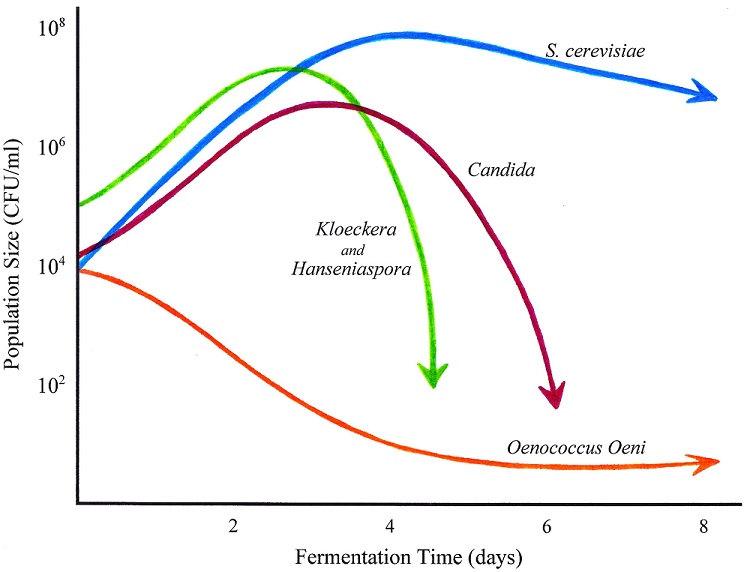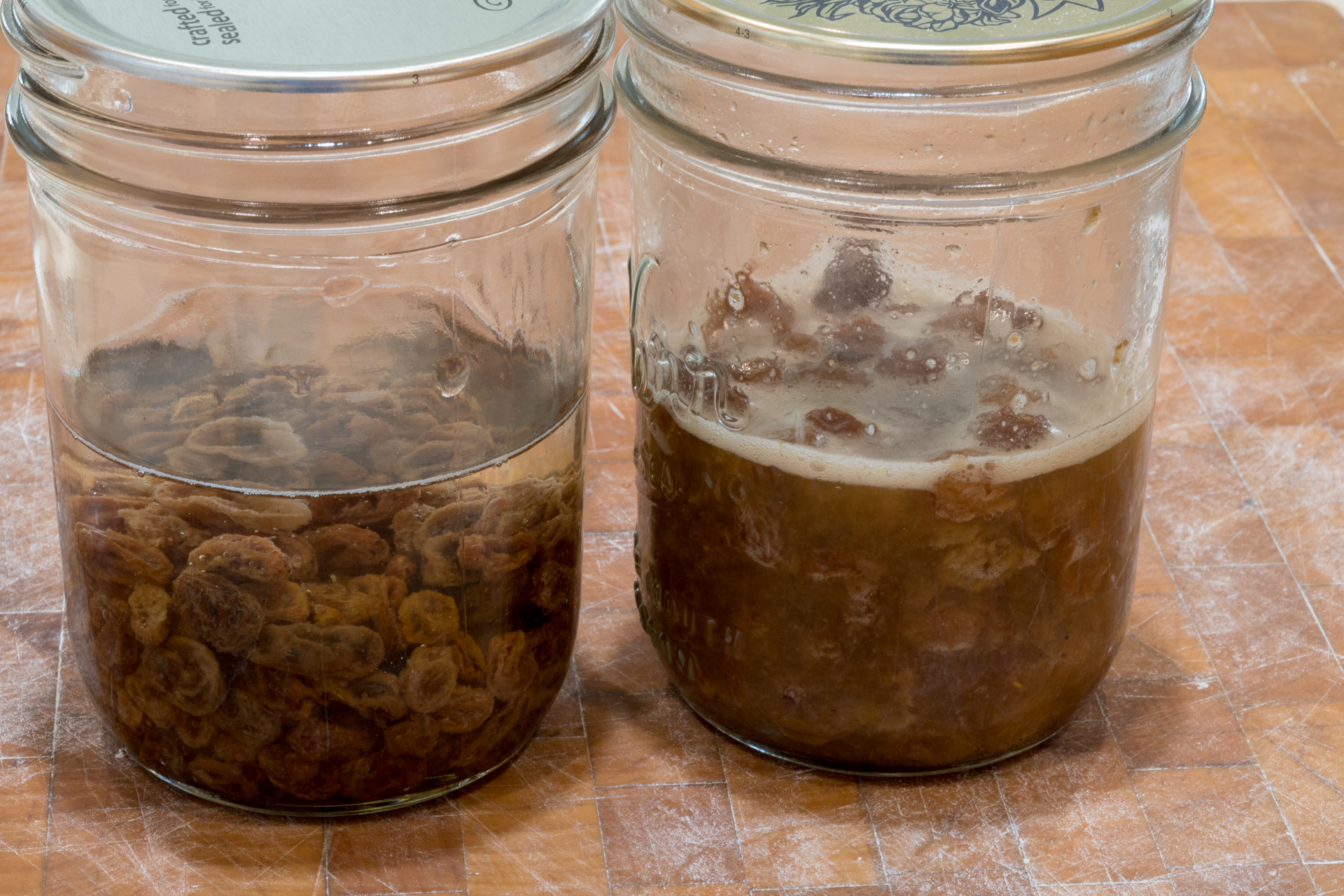Cooking & Baking
Related: About this forumMaking sourdough with yeast water
With commercial yeast being in short supply I had been thinking about sourdough again. The problem with this is you need a good amount of flour to get the starter going and considerably more if you want to use it often.
So I started doing some research on alternate methods and it turns out you don't need flour at all. Yeast, including natural yeast and bacteria found in sourdough need only oxygen, food, temperature, and time to grow. Traditionally you feed your culture with flour from grains, but as any winemaker knows, sugar works just fine.
The process is pretty simple, just take any fruit that contains active yeast and grow it in a container with water and sugar. Once you have a robust culture going, simply use some of it to hydrate a preferment or all of your dough and away you go.
I'm using Pablo's method, but instead of dates I'm using a handful of dried cherries because that's what I have. According to most sources it takes about 8 days from start to when your culture is ready for use. I'm on my 3rd day today and there's definitely some yeast action going, so I know I'm on the right track. I know this because when I shake up my culture and remove the lid, I get a nice little 'poof' telling me the yeast is growing which creates carbon dioxide which pressurizes the bottle. Tomorrow I will add more water, sugar, and cherries. I'm using just plain old tapwater for this, which naturally contains some residual chlorides. This might work better with filtration that removes chlorides, the benefit being you might shave off a day before the culture is ready (or maybe not, haven't tried). At any rate your normal tap water should work regardless.
I'll let you know how it ultimately turns out, but I think this method has a number of advantages. I think it's more foolproof than regular sourdough. Other than shaking and opening the bottle twice per day, there's less steps and less mess. You can drink the excess culture that you're removing as it's basically just a low alcohol content cider so no more figuring out what to do with culture removed at feedings. You can also convert it to a normal sourdough/levain culture at any time. Simply hydrate the flour of your choice with your yeast water and boom, literally instant starter.
Most fresh fruit and dried fruit should work well for this. I'm sure some works better than others, but I have no idea which those would be. I'm using store bought dried cherries. If you have homemade dried fruit it might not work if you are using heat to dehydrate. Temperatures much above 130F are going to kill the yeast.
https://www.kingarthurflour.com/blog/2020/02/24/baking-bread-with-a-yeast-water-starter
getagrip_already
(17,802 posts)What I'm wondering is how it will do with flour as the food group. It grew up on sugar, not carbs. It may take some acclimation to be a good flour based yeast.
Btw, making natural sourdough starter doesn't take a "lot" of flour. You can start with 1/4 cup and add a couple of teaspoons of flour and water a day, as long as you remove an equal amount. In about a week you can start to add and leave it to get a couple of cups worth.
By ten days, it should be ready to use. Not a lot wasted, and you can use what you remove for other things that don't involve rising with yeast (pancakes, cakes, etc).
It keeps well in the fridge. You just need to feed it and give it a day or three when you mtake it out to use again.
But then again, sourdough bread for me is a two day effort anyway. So a little extra time for yeast is just part of the process.
Major Nikon
(36,925 posts)Starches are nothing more than sugar molecules linked together. The acidity of the starter is what breaks down starches into component sugars, which is the same way your own body does it.
How much you feed your starter depends on a number of factors including how soon it's going to be ready to use and how sour do you want the finished product. Personally I like a culture that does not produce a very sour loaf and I like it to be ready for use relatively soon, so that takes a decent amount of flour as I'm throwing away almost everything at feeding and using quite a bit in my preferment. This is basically the French way of doing it as they consider 'sour' dough to be a defect.
eleny
(46,176 posts)I shrink from making traditional sourdough. The idea of having smelly goop growing in a container in the fridge turns me off. Especially if I screw up and it's super gross. Besides, flour is precious these days. I'm having a tough time finding rye flour online at anywhere near a decent price. So I'm down to a nub of the small bag of Bob's Red Mill rye.
But I know I have to do something like that to make a good tasting rye bread with the last of our rye flour. This sounds like a good way to ease into making culture since we have dried cherries in the freezer. Now to find a bottle!
Thanks so much for posting.
Major Nikon
(36,925 posts)CrispyQ
(40,812 posts)It's bubbling on my counter top right now.
Good luck!
mitch96
(15,719 posts)One story is the gold rush "forty-niners" prized their starter so much some actually kept it around their neck in little pouches. The other is this one...
m
"The starters were so important that they would cuddle them on cold nights so the yeasts and bacteria that made them viable didn’t die"
https://www.smithsonianmag.com/smart-news/gold-miners-kept-their-sourdough-starters-alive-cuddling-them-180962689/
Major Nikon
(36,925 posts)In winter months, those in poorly heated cabins would also do the same. Commercial yeast wasn’t available until the mid 19th century, so prior to this all yeast breads used natural yeast.
You can freeze yeast without killing it. In fact that’s where I store mine. It has more to do with keeping it viable. Starter stored in cold temperatures might need a day or more to become viable enough to make bread. Stored in a warmer environment like next to your body, it was viable immediately.
CrispyQ
(40,812 posts)Major Nikon
(36,925 posts)This web site is a pretty good resource. Lots of extremely knowledgeable bakers there.
One of the yeasts being cultured is saccharomyces cerevisiae which is the same monoculture found in all the baker's yeast you'll find at your local market. This type of yeast is used commercially because it produces the most leaving and is almost always also found in all types of sourdough starter. What you also get is a few other yeasts along with some bacteria which add various flavor notes not found in bread made with commercial yeast.
http://www.thefreshloaf.com/node/60897/raisin-yeast-water

MagickMuffin
(18,230 posts)He mentioned ginger and lemon. I think I'd like to try that!
Thanks for posting this, I'm not a bread maker but I love the alchemy of cooking.
Major Nikon
(36,925 posts)The smell isn't all that great but the taste isn't bad.
MagickMuffin
(18,230 posts)What fruit did you use?
Major Nikon
(36,925 posts)After the first day a small amount of salt was added to each subsequent batch.
MagickMuffin
(18,230 posts)bought a bunch of fresh ginger. Some are sprouting (which I plan on growing) but there is still plenty to make some fermented water.
Major Nikon
(36,925 posts)If you store it tightly closed (like in a capped mason jar or PEP bottle) it will carbonate. You can flavor it with whatever you like.
I like using PEP bottles because they will swell and let you know it's time to let off some pressure before it bursts.
MagickMuffin
(18,230 posts)What are PEP bottles? I did a google search and not sure I found what you mentioned.
Major Nikon
(36,925 posts)I meant to say PET bottles which are the plastic bottles used for soft drinks
Major Nikon
(36,925 posts)I tried a few different ways of using dried cherries. In all instances dough fermentation time to triple volume was quite long at around 20 hours. My last experiment was a much simpler method. 75g of dried cherries with 150g of purified water. No other ingredients were added and I did not stir or agitate the mixture for the total 4 day culture. The mixture was left in my homemade proofing oven and held to 80F. The method was pretty simple and other than the same 20 hour dough fermentation went pretty well. No mold growth was observed. Taste was similar with some nice cherry notes in the bread due to much more fruit used.
Now I'm doing some experimentation with raisins and the same 75/150g fruit to water ratio. The first try was a bust as I got mold growth 2 days into the culture. Lesson learned, you have to give it at least a daily stir when you use raisins as they are much more susceptible to mold.
2nd try with raisins is going much better. In the picture below the one on the right has been culturing for 3 days and the one on the left was started just today. I've been stirring once per day and I'm seeing a lot of yeast activity. I'll probably start a preferment tonight, then ferment, proof, and bake tomorrow.

